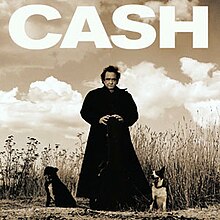American Recordings (album)
| American Recordings | |||||
|---|---|---|---|---|---|
 |
|||||
| Studio album by Johnny Cash | |||||
| Released | April 26, 1994 | ||||
| Genre | Folk, country | ||||
| Length | 42:45 | ||||
| Label | American, Sony | ||||
| Producer | Rick Rubin | ||||
| Johnny Cash chronology | |||||
|
|||||
| American series chronology | |||||
|
|||||
| Professional ratings | |
|---|---|
| Review scores | |
| Source | Rating |
| AllMusic | |
| Chicago Tribune | |
| Encyclopedia of Popular Music | |
| Entertainment Weekly | A |
| Los Angeles Times | |
| MusicHound Country | 5/5 |
| NME | 9/10 |
| Q | |
| Rolling Stone | |
| The Rolling Stone Album Guide | |
American Recordings is the 81st album by the country singer Johnny Cash. It was released in April 1994 by the American Recordings label, after it had changed its name from Def American.
Cash was approached by producer Rick Rubin and offered a contract with Rubin's American Recordings label, better known for rap and heavy metal than for country music. Under Rubin's supervision, he recorded the album in his living room, accompanied only by his guitar. For years Cash had often been at odds with his producers after he had discovered with his first producer, Sam Phillips, that his voice was better suited to a stripped-down musical style. Most famously he disagreed with Jack Clement over his sound, Clement having tried to give Cash's songs a "twangy" feel and to add strings and barbershop-quartet-style singers, and his successful collaboration with Rick Rubin was in part due to Rubin seeking a minimalist sound for his songs.
The songs "Tennessee Stud" and "The Man Who Couldn't Cry" were recorded live at the Viper Room, a Sunset Strip, Los Angeles nightclub owned at the time by Johnny Depp. "The Beast in Me" was written and originally recorded by Cash's former stepson-in-law Nick Lowe.Glenn Danzig wrote "Thirteen" specifically for Cash in less than twenty minutes. The album cover was photographed while Cash was visiting Australia, at Werribee near Melbourne.
American Recordings was released on April 26, 1994, to widespread acclaim from critics.Q magazine deemed it the year's most sincere and ambitious record, while NME found it "uplifting and life affirming because the message is taught through adversity, ill luck and fighting for survival".David Browne, writing in Entertainment Weekly, said Cash remained a captivating singer throughout the austerely arranged country ballads and bizarre reflections, calling the record "his most relaxed and folkiest album in three decades". In a rave review for Rolling Stone, Anthony DeCurtis hailed it as one of Cash's greatest albums because of his self-possessed, "biblically intense" take on traditional folk songs and Rubin's no-frills production: "American Recordings is at once monumental and viscerally intimate, fiercely true to the legend of Johnny Cash and entirely contemporary." Mark Cooper from Mojo called it a "breathtaking blend of the confessional and the self-mythologising". In the Chicago Tribune, Greg Kot wrote that Cash's singing was effectively dramatic throughout "the quagmire of humor and bloodshed, pathos and treachery evoked by these songs", while Los Angeles Times critic Randy Lewis said they "peer into the dark corners of the American soul" on what was a "milestone work" for Cash.
...
Wikipedia
